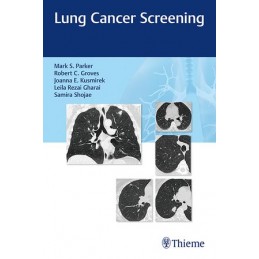- Reduced price

Order to parcel locker

easy pay


 Delivery policy
Delivery policy
Choose Paczkomat Inpost, Orlen Paczka, DHL, DPD or Poczta Polska. Click for more details
 Security policy
Security policy
Pay with a quick bank transfer, payment card or cash on delivery. Click for more details
 Return policy
Return policy
If you are a consumer, you can return the goods within 14 days. Click for more details
Lung cancer is the leading cause of cancer-related death among men and women in the U.S. and worldwide. For many decades, lung cancer was the sole cancer among the deadly four without an evidence-based screening method for decreasing mortality. This changed in November 2011, when findings from the National Lung Cancer Screening Trial showed low-dose lung CT screening was more efficacious in reducing deaths in high-risk individuals than conventional radiography. As such, an ever-increasing number of health organizations now recommend this screening protocol.
Lung Cancer Screening by Mark Parker and esteemed VCU Health colleagues, fulfills the dire need for a comprehensive guide explaining the crucial aspects of lung cancer screenings. The first two chapters lay a foundation with discussion of lung cancer epidemiology and risk factors beyond cigarette smoking. Subsequent chapters cover the fundamentals, with clinical pearls on setting up a successful lung cancer screening program, patient eligibility criteria, imaging variances of tumors in the lungs, screening pros and cons, and interpreting/reporting screening results.
This state-of-the-art guide is essential reading for radiologists, oncologists, pulmonologists, and internists. It is a must-have bookshelf reference for hospital radiology and oncology departments, in particular for those setting up new lung cancer screening programs.
Data sheet
1 Lung Cancer Epidemiology
2 Risk Factors for Lung Cancer
3 Evolution of Lung Cancer Screening
4 Lung Cancer Screening Pros and Cons
5 Variable Imaging Presentations of Lung Cancer
6 Lung Cancer-Screening Results Reporting
7 Detection and Management of Unexpected Incidental Pulmonary and Nonpulmonary Findings
8 Elements of a Successful Lung Cancer-Screening Program
9 Future of Lung Cancer Screening
10 Test Cases: Applying Lung CT Screening Reporting and Data System (Lung-RADS)
